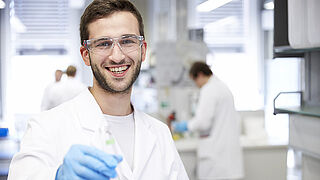WESSLING is a partner in the new microplastics research consortium MOMENTUM
The microplastics experts at WESSLING are partners in the new Dutch research consortium MOMENTUM, which will begin its work during the coming months. The aim of the consortium, which brings together universities, research institutions and industrial partners, is to investigate and ultimately prevent the effects of micro- and nanoplastic particles on human health. WESSLING will assist with its expertise on micro- and nanoplastic analysis in order to gain new insights. The project is funded by the Netherlands Organisation for Health Research and Health Innovation (ZonMw), the Netherlands Organisation for Applied Scientific Research (TNO) and the communication platform Health~Holland, which have now jointly allocated 5.4 million euros to the MOMENTUM consortium. The project is scheduled to run for three years.
The basis for the decision to provide the funding was a comprehensive knowledge review commissioned by the Dutch Ministry of Infrastructure and Water Management from the ZonMw, for which the ZonMw drew on the expertise of various parties, including researchers, companies, policy makers as well as representatives of the Dutch Initiative for Educational Research (NGO) and other stakeholders.
Central points of the new research project MOMENTUM
The research association is working to improve our understanding of the degradation processes of micro- and nanoplastics (MNP) from plastics. This requires suitable analysis methods for characterising the particles, which WESSLING will contribute to the project. Furthermore, analytical methods are being developed to examine MNP in the human body, for example in blood and tissue. The consortium is investigating where the particles are deposited or accumulate, for example, in the respiratory tract or in the stomach and intestinal tract. The effects on the immune system are also being studied. In addition, these particles can also act as carriers of pathogens. This aspect will also be looked at more closely in the project. Based on the results, proposals for risk assessment will be developed and possible solutions will be explored that can, for example, prevent negative effects of micro- and nanoplastics on human health.



